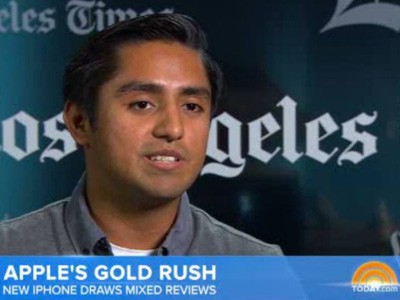Salvador Rodriguez graduated from Arizona State University just in 2012, but he’s already made a name for himself as Lead Reporter at the Los Angeles Times’ Tech Now blog. Rodriguez’s interest in technology reporting began when he interned at the Times two years ago. Now a full time employee, Rodriguez covers tech giants like Facebook, Google and Apple, writing gadget reviews and breaking news stories.
Technology reporting is an incredibly popular field to write for, which also means it’s that much more competitive for a journalist to separate themselves from the crowd, Rodriguez says. It’s not uncommon for him to break a news story and then have other writers pick it up and write their own articles based on what he kicked off. That makes it even more important to stand out in that crowd of tech writers, he said. To do, it’s crucial to keep his audience in mind as he’s digs for unique angles.
But with these challenges comes the reassurance of reporting on a topic that consumers care about and keep up with.
Getting his hands on the latest toys before the general public is a nice perk too, says Rodriguez. He’s also surprised by how the companies he’s covering actually read what he’s writing.
He recently took a break from the tech world’s busy gadget premiere month in October to talk with the Reynolds Center about his experiences as a reporter in the fast paced beat. He shares the obstacles he faces as a reporter, how to set yourself apart, and tips on how to stay up to speed with technology’s never ending news feed.
1) Because your educational background is in a non-technology field, how did you prepare for tech reporting? Do you feel it’s an advantage or disadvantage to come to tech as a non-tech person?
When I interned at the LA Times two summers ago, I was helping them with tech coverage simply because it was something that I was interested in. In the last decade or so, technology has become a very acceptable thing. I’m not technically educated, like taking apart a computer and putting it back together. I definitely approach it from a consumer angle.
There are advantages to that. Because I write for the LA times, I’m not writing for the hardcore techies. They’re going to other websites like Ars Technica or the Verge, because those guys go in more detail. I’m writing more for a casual person who still cares about tech, but it’s not something they worry about every single day of their life. Like, my brother or my mom. So it helps put things in perspective for them. But I am at a disadvantage when it comes to writing for a developer or programmer.
2) What advice would you give a reporter who wants to get started on a technology beat?
Know your audience. That was a big thing for me because tech is just buzzing like crazy right now. It’s a very busy field and there are a lot of journalists covering it. So you need to know what your audience cares about. For example, TechCrunch writes about something today, and it might very well be news for its audience, but it might not be news for my audience for another year.
“It’s just a matter of picking
and choosing (a focus) and
not having as they say FOMO,
which is Fear of Missing Out.”
That just goes back to who they’re writing for. They might get a lot of traffic because of a lot of programmers are fascinated by the article, but for my readers it might just go straight over their head. So I would not get any traffic at all because those concepts are not really a product they can touch and feel just yet. Even though I cover tech and someone else at Engadget covers tech, we’re covering it for different people therefore our stories are different and our guidelines for what is newsworthy are different as well.
Also, just read about it every single day. I almost feel like all the tech companies get together and share some big PR calendar so that their announcements don’t overlap, because they rarely do. And it seems like there is always an announcement every single day that is at least noteworthy. If you stop reading for two weeks, you can miss a crucial detail. I have all these alerts set up, and I’m signed up for all these newsletters so that I can read what others are writing and get the latest news.
3) Technology can be about gadgets, the company, investing in a company or about how a company impacts an industry. Do you have any tips for a tech reporter on how to keep focus?
You have to choose one and go with it. Fortunately, tech is so large that it’s OK if you cover something and someone else covers a different part of it. There’s a million different things going on. For example: Twitter IPO is still tech because it’s Twitter but it’s honestly a financial story. And then you have NSA which is a privacy story, then you have Chinese hackers which is a security story. And you have 4Chan and Reddit, and you have social networks and apps and hardware and software so there’s no way you can cover all of it.
What I focus on is basically consumer tech and with a very strict focus on the top guys … who are, for us, Facebook, Google and Apple and then basically anything else that’s unusual or that truly stands out. It’s just a matter of picking one and choosing and not having as they say FOMO, which is Fear of Missing Out.
4) What are some of the biggest challenges that you face as a tech journalist and how do you prepare for them and overcome them?
For me, one of the challenges is access. For example, three of the biggest gadgets of the season have come out and I haven’t gotten a chance to review them. The companies are very strict about who they give them to first. There are so many reporters so it kind of has to happen. And because I’m not in places like the Bay Area, it makes it harder for me to build sources.
The biggest challenge is differentiating your article, and for us what we try to do is make it very consumer friendly. For example when the Galaxy Gear came out which is Samsung’s smart watch, rather than us taking just the straight on “Samsung announces smart watch” story, what I did was “Ten things that you need to know about the Galaxy Gear” with a photo gallery. It’s taking approaches that make it consumer friendly or will show Google News that your story is at the very least an attempt to be different from the pack. You’re not doing things for page views, but at the end of the day, publishers and top editors care about page views because that means ad money. But if you’re not getting page views that also means that not many people read what you wrote. Essentially that means that it really wasn’t newsworthy to your audience. From a strict journalism perspective, page views do matter, so that obviously is the biggest challenge. Trying to find a different angle of a story in a field where there are a million and one journalists.
5) When you’re covering a corporation as large as Apple, how do you set yourself apart from other journalists at other publications covering the same beat?
Know your audience and focus on what your mission is. For us, it’s Apple. It’s what the biggest page views are. So what it means to us is letting our readers know everything that a consumer would need to know. You’ll be surprised to know the top companies view what you’re writing. I was talking to the creator of the Microsoft Surface Tablet and at least two or three times during that interview he mentioned some things he had seen me write or some things that I said from my review. He almost said that, not me alone, but me and other journalists who said the same kind of thing inspire a new accessory that they have for their new tablet this year. So they are definitely paying attention.
You’re goal is to report things accurately and objectively, and the original questions was how do you stand out? And at the end of the day, it’s simply that way. In other countries you can pay for good coverage. Here, companies can only hope that you cover something objectively, and if you do that they’ll respect you. And that’s how you get the leaks and early access and that kind of stuff. I’ve only been at it a year and a half, but through my coverage, I have gotten early access from some companies. Write something accurately and show your sources that you’re trustworthy.










